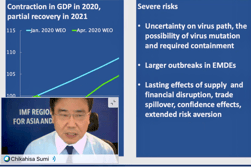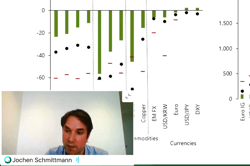News from Asia and the Pacific
IMF Tokyo Shares Analysis of Global, Regional Economic Prospects at its First Virtual Seminar
May 28, 2020, Tokyo, Japan – In an effort to reach out to its audience virtually in the midst of the COVID-19 pandemic and share the IMF’s economic surveillance findings and policy recommendations, the Fund’s Regional Office for Asia and the Pacific (OAP) today held its first webinar on global and regional economic prospects and financial market developments.
This first virtual IMF Economic Issues Seminar hosted by OAP—in which two speakers shared key takeaways from the April 2020 editions of the IMF’s World Economic Outlook (WEO) and Global Financial Stability Report (GFSR)—drew 53 people from public agencies, universities, the private sector and the media.
 Presenting key points from the WEO, Chikahisa Sumi, Director of the regional office, described the pandemic shock as “a crisis like no other” and said that the global output loss over 2020 and 2021 could amount to $9 trillion. “Containment is the very first priority… We must take the necessary steps to safeguard lives and livelihoods so that when the pandemic is contained the recovery will be smooth and fast,” he said. He then explained monetary and fiscal policies being taken to offset the pandemic shock and stressed that, “…governments need to do whatever it takes, as much as they can, but keep the receipts for accountability.”
Presenting key points from the WEO, Chikahisa Sumi, Director of the regional office, described the pandemic shock as “a crisis like no other” and said that the global output loss over 2020 and 2021 could amount to $9 trillion. “Containment is the very first priority… We must take the necessary steps to safeguard lives and livelihoods so that when the pandemic is contained the recovery will be smooth and fast,” he said. He then explained monetary and fiscal policies being taken to offset the pandemic shock and stressed that, “…governments need to do whatever it takes, as much as they can, but keep the receipts for accountability.”
Sumi elaborated on recent global and regional economic developments and discussed alternative outlook scenarios and risks, before sharing the IMF’s broad policy advice for countries both during and beyond the crisis. “We need to be united against the COVID-19 pandemic,” he concluded, adding that the IMF is facilitating international cooperation to help its members cope with the extremely difficult challenges they currently face.
 Jochen Schmittmann, IMF Resident Representative in Singapore, subsequently discussed recent financial market developments and some material from the latest GFSR. He described how after the COVID-19 outbreak the prices of risk assets collapsed, and market volatility spiked, while expectations of widespread defaults led to a surge in borrowing costs. He said, however, that decisive monetary, financial and fiscal policy actions aimed at containing the fallout from the pandemic managed to stabilize investor sentiment in late March through early April, which helped pare back market losses.
Jochen Schmittmann, IMF Resident Representative in Singapore, subsequently discussed recent financial market developments and some material from the latest GFSR. He described how after the COVID-19 outbreak the prices of risk assets collapsed, and market volatility spiked, while expectations of widespread defaults led to a surge in borrowing costs. He said, however, that decisive monetary, financial and fiscal policy actions aimed at containing the fallout from the pandemic managed to stabilize investor sentiment in late March through early April, which helped pare back market losses.
“However, it's important to keep in mind that there are still stresses in some markets and uncertainty and risks remain high,” he warned, adding that monetary and financial policies should continue to remain supportive to minimize permanent damage to the economy and enable a strong recovery.
Following the presentations, a number of viewers posed questions. Some raised concerns about potential increases in banks’ non-performing loans and the future of global value chains. Another asked whether the global expansionary policy stance could lead to inflationary pressure. There was also a voice asking how countries in the world could use the reset after the pandemic to catch up on their Sustainable Development Goals (SDGs), to which Sumi responded that a greener recovery is highly hoped for. Many viewers responded to the post-seminar survey and expressed their appreciation for the opportunity to learn about global and regional economic prospects and market developments during the COVID-19 crisis. Some requested additional virtual events to learn more about IMF emergency financing and its effectiveness during the COVID-19 pandemic and post-crisis fiscal sustainability in various countries.
Agenda |
|
|
2:00-2:30 pm |
Part 1 |
|
2:30–2:50 pm
|
Part 2
IMF Global Financial Stability Report |
|
2:50–3:15 pm |
Q & A |
Speakers’ bios
- Chikahisa Sumi is the Director of the IMF Regional Office for Asia and the Pacific. He has worked on Asia and the Pacific countries for eight years in the IMF, including leading missions to the Philippines, Singapore, New Zealand and Fiji. He also headed the Financial Sector Surveillance Group of the IMF Asia and Pacific Department (APD), and led the Future of Asia’s Finance project including the publication of “The Future of Asian Finance” book in 2015. Before returning to the IMF, Mr. Sumi held key positions in the Japanese Government, including Deputy Vice Minister of Finance for International Affairs and Deputy Commissioner of Financial Services Agency.
- Jochen M. Schmittmann is the IMF Resident Representative in Singapore, covering Singapore, Malaysia, and financial market developments across Asia. Prior to moving to Singapore, Jochen worked in the Asia and Pacific, Western Hemisphere, Finance, and Monetary and Capital Markets departments at the IMF. Jochen has published on a range of topics in finance and macroeconomics, including behavioral finance, currency hedging, and the economic impact of demographic change in Asia. He holds a Ph.D. in Financial Economics from Goethe University Frankfurt.


